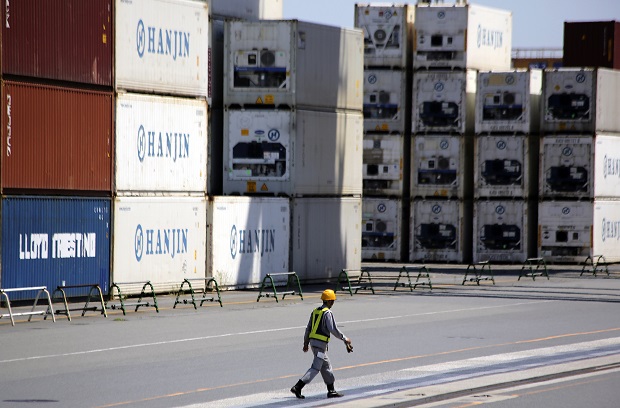
In this August 20, 2014 file photo, a port worker walks past piles of cargo at a container terminal in Tokyo. Japan’s economy grew at a 2.2 percent clip in the last quarter on a sharp recovery in exports. The preliminary data released Monday, Feb. 16, 2015, show the world’s third-largest economy emerged from recession in October-December, as many economists had forecast. AP
TOKYO, Japan – The Japanese economy limped out of recession in the final three months of last year, official data showed Monday, but growth was flat for 2014 and the weaker-than-expected figures were likely to boost calls for more central bank stimulus.
The tepid results come after the world’s number-three economy contracted between July and September — the second consecutive quarterly decline — as consumer spending dropped sharply following an April sales tax rise aimed at shrinking Japan’s massive national debt.
But the country has since been seeing signs of a modest recovery — including an uptick in factory output and a tight labor market. Economists had widely expected a 0.9 percent expansion between October and December.
The government figures on Monday showed a weaker-than-expected 0.6 percent growth rate in the three months to December, or 2.2 percent on an annualized basis.
Over the full year, the preliminary data showed a flat 0.0 percent growth rate for 2014, after a 1.6 percent expansion in 2013. Revised figures will be released in the following weeks.
By contrast, the US economy grew at its fastest pace in four years in 2014, expanding at an annualized rate of 2.4 percent.
“While Japan’s economy has finally left the tax-related weakness behind, the increase in Q4 GDP fell short of expectations and supports our view that the Bank of Japan will announce more stimulus in April,” Marcel Thieliant from Capital Economics said a note after the figures were released.
“Today’s result indicates that the Bank of Japan’s view on growth is too optimistic, and we still believe that the Bank will announce more easing at the late-April meeting.”
Uncertain future
Last month, Japan’s central bank slashed its inflation outlook as plunging oil prices dent efforts to slay years of deflation. But policymakers still boosted their growth forecasts, saying the economy would expand by 2.1 percent in the fiscal year to March 2016, up from an earlier 1.5 percent forecast.
Prices were on the rise, largely due to Japan’s heavy post-Fukushima energy bills, but oil rates have tumbled by about half since the summer.
The BoJ’s inflation target is a cornerstone of Tokyo’s wider bid to turn around years of tepid growth by generating price rises and prompting firms to boost their hiring and expansion plans.
But the sales tax rise — Japan’s first in 17 years — slammed the brakes on consumer spending, plunging the economy into recession and throwing the success of Prime Minister Shinzo Abe’s growth plan, dubbed Abenomics, into question.
Abe’s pro-spending policy blitz — which also calls for major reforms to the highly regulated economy — boosted stock prices and pushed the yen down, a plus for Japanese exporters.
The levy hike to 8.0 percent from 5.0 percent threw the plan off kilter.
The tax rises are aimed at paying down Japan’s enormous national debt, one of the heaviest burdens among wealthy nations, but they have put Abe in a tricky position as he tries to balance them with his growth plan.
Faced with souring economic data, Abe delayed a second tax hike planned for this year to 2017.
He also dissolved the lower chamber of parliament for snap elections in December, two years ahead of schedule, which he and his Liberal Democratic Party ultimately won.
RELATED STORIES
Japan economy enters recession after surprise Q3 contraction
Japan recession worse than thought—data